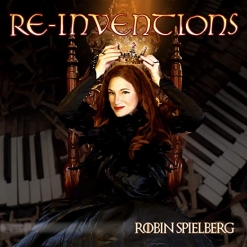Re-inventions is pianist/composer Robin Spielberg’s first collection of classical music, arranged and “re-invented” during the 2020 pandemic. Inspired by the historical fact that classical composers often held “soirees” where they presented alternate versions of each others’ music, Robin decided to do something similar with favorite classics that she re-discovered while going through her “treasure trove” of sheet music. In the liner notes of the CD and LP, Robin tells the story of one of her piano teachers slapping her hand when she played a new melody for a Chopin waltz. I never had my hand slapped, but my piano teacher also considered the classics to be sacred and not to be altered in any way, which is contrary to how the composers themselves regarded their music. Most of the fifteen tracks on the album will be familiar to just about everyone and are different from the originals - but not so different that they are unrecognizable. Most of the tracks are solo piano, but there are a few duets that include Tina Guo on cello; Ricardo Ochoa on violin; Robin’s daughter, Valerie Kosson, on bells; and Robin’s husband, Larry Kosson, on guitar. A Steinway Artist, Robin recorded the album on an 1898 Steinway.
Re-inventions begins with Sonata No. 16 in C Major, a piece Mozart composed when he was 12 and one of the first classical pieces many children learn as piano students. Franz Liszt’s “Liebestraum” is one of the most beautiful pieces ever composed and Robin has “re-invented” it as a piano/cello duet. Tina Guo’s soulful cello makes the music even more poignant, and this is one of my favorite tracks. Anton Rubinstein’s “Melody in F” has been “re-invented” as a piano/violin duet, giving the delicate melody a gentle lilt. Robert Schumann’s “Scenes From Childhood” is actually a collection of thirteen piano solos, and Robin’s arrangement is of the first one: “Of Foreign Lands and People” or “About Strange Lands and People.” I’ve always loved the bittersweet quality of this piece and Robin’s improvisations around the melody beautifully update it - also a favorite. Robin’s music-major daughter, Valerie, joins her with some sparkling bell additions on “The Skater’s Waltz,” a piece that always sent me to Fantasyland as a kid. JS Bach’s “Prelude and Fugue No. 1 in C Major” is actually only the Prelude on the album and is performed very close to the original. Valerie joins her mom again for Strauss’ “The Blue Danube Waltz.” Sometimes very quiet and delicate and sometimes bigger and more playful, it’s a fun arrangement. What would a collection of piano classics be without Beethoven’s “Moonlight Sonata” (aka the first movement of Sonata #14 in C# Minor)? This one is also performed very close to the original. I wasn’t sure anyone could bring anything new to the “Brahms’ Lullaby,” but Robin’s delicate arrangement is so sweet and loving that it sounds fresh and new. The main theme of Chopin’s “Fantasie-Impromptu, Op. 66” is a lovely piano/guitar duet with Robin’s husband, Larry. Franz Schubert’s “Serenade” (Standchen) is a piece I remember my mother playing after my brother and I had gone to bed, and I still love it dearly. It was originally composed as a vocal piece, but is probably best-known as a piano solo. Robin’s “re-invention” is beautifully haunting and brings the album to a quiet close.
Re-inventions is available as a CD and a double-LP as well as to stream and download from
www.robinspielberg.com and on Amazon. Sheet music is also available from Robin’s site and a songbook is available that includes the duets as well as all of the piano solos. This is a very special collection and shows us a different side of Robin - she “re-invented” herself, too!

